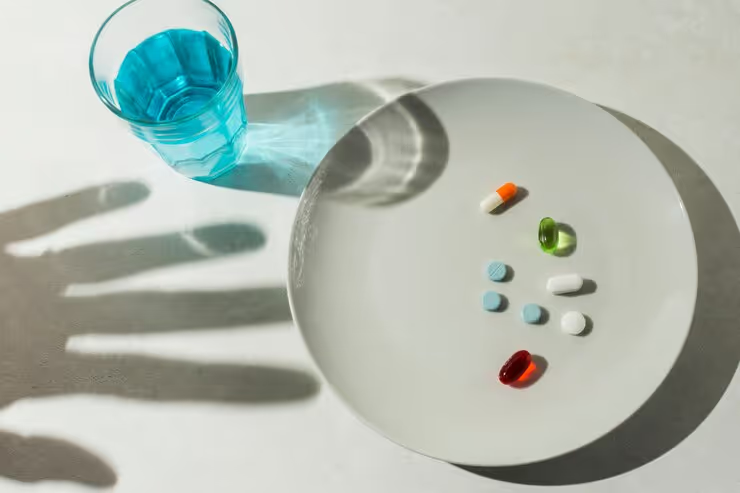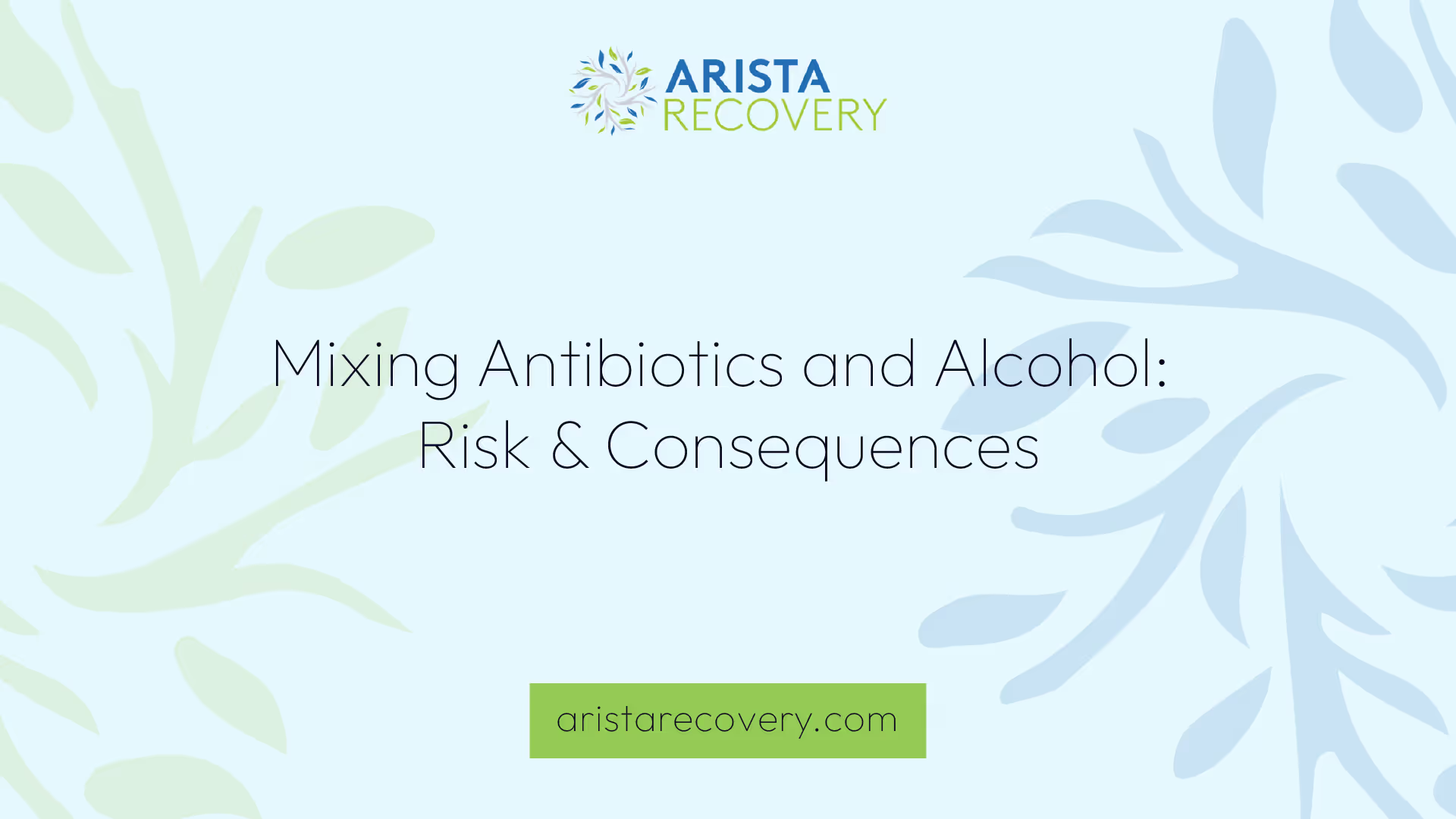Mixing Antibiotics and Alcohol: Risk & Consequences

Understanding Antibiotics
To comprehend the risks of mixing antibiotics and alcohol, it's crucial to understand what antibiotics are and how they work.

Role of Antibiotics in Fighting Bacterial Infections
Antibiotics are medicines designed to fight infections caused by bacteria. They operate by killing bacteria or making it difficult for them to grow and multiply. These powerful medications are used to treat a variety of bacterial infections, such as strep throat, urinary tract infections, and E. coli.
It's important to note that antibiotics are not effective against viral infections like the cold or flu. This is because viruses are fundamentally different from bacteria and require different treatment strategies [2].
Importance of Proper Antibiotic Use
The appropriate use of antibiotics is critical for maintaining their effectiveness and preventing side effects. Misuse of antibiotics, such as taking them for viral infections, can lead to unwanted side effects and contribute to the problem of antibiotic resistance—this is when bacteria evolve to resist the effects of antibiotics, leading to the development of harder-to-treat "superbugs".
Additionally, when taking antibiotics, it's crucial to consider other substances that may interact with these medications. For instance, antibiotics taken with alcohol can increase the risk of side effects such as upset stomach, nausea, and diarrhea [4].
Understanding the nature of antibiotics and the importance of their proper use is the first step in appreciating the risks associated with combining antibiotics and alcohol. As we delve further into this topic, it becomes increasingly clear that caution and knowledge are key to ensuring the safe and effective use of antibiotics.
Antibiotics and Antibiotic Resistance
In this era of modern medicine, antibiotics have been a game-changer. However, their misuse or overuse can lead to antibiotic resistance, a growing concern worldwide. This section will delve into the causes of antibiotic resistance and the impact of antibiotic overuse.
Causes of Antibiotic Resistance
The most significant cause of antibiotic resistance is the inappropriate use or overuse of antibiotics. As much as 28 percent of antibiotic use is thought to be unnecessary, according to Healthline.
When antibiotics are used excessively or inappropriately, bacteria can develop resistance to them. This means that the antibiotics become less effective over time, and in some cases, they may not work at all. This can lead to prolonged illness, more complicated treatment options, and a higher risk of complications.
Impact of Antibiotic Overuse
Antibiotic resistance is a significant concern, as germs that become resistant to antibiotics can lead to severe and potentially life-threatening infections. According to Medical News Today, at least 2.8 million people in the United States contract antibiotic-resistant bacteria or fungi annually, with over 35,000 deaths resulting from these infections.
Antibacterial-resistant infections may not respond to any available antibiotics, highlighting the importance of combatting antibiotic resistance. The use of antibiotics, while crucial in certain situations, should be restrained and only taken under the guidance of a healthcare provider.
Responsible use of antibiotics is crucial to combat antibiotic resistance. It is recommended to follow your healthcare provider's advice on when to take antibiotics and not to request them unless prescribed by a professional. By understanding the risks associated with antibiotics and alcohol, one can make an informed decision to protect their health and wellbeing.
Alcohol and Antibiotics Interaction
Understanding the interaction between alcohol and antibiotics is crucial for anyone who is undergoing antibiotic treatment. Mixing the two can lead to a number of potential problems, ranging from reduced effectiveness of the medication to severe health complications.
Effects of Alcohol on Antibiotics
While alcohol generally doesn't make most antibiotics less effective, it can increase the risk of experiencing certain side effects [5]. For example, drinking alcohol while taking antibiotics can cause a range of symptoms such as drowsiness, dizziness, and an upset stomach.
In addition, some types of antibiotics, like Doxycycline and Erythromycin, may be rendered less effective when consumed with alcohol. This can hinder the recovery process, as the intended effects of the antibiotic may be reduced, leading to a longer recovery time or even treatment failure.
Antibiotics Prone to Interactions with Alcohol
Certain antibiotics are particularly prone to negative interactions with alcohol. For instance, drinking alcohol while taking Metronidazole, Tinidazole, Cefoperazone, Cefotetan, or Ketoconazole can lead to potentially dangerous reactions. It's advised to avoid alcohol before, during, or up to three days after taking these drugs.
Furthermore, some antibiotics such as Metronidazole, Linezolid, Sulfamethoxazole, and Trimethoprim can cause severe fatigue, throbbing headaches, dizziness, anxiety, chest pain, heart palpitations, digestive issues, and damage to vital organs if mixed with alcohol [4].
Drinking alcohol while taking Griseofulvin can also lead to adverse reactions [5].
To illustrate, here's a table summarizing the antibiotics that can have harmful interactions with alcohol:
In order to ensure the effectiveness of antibiotic treatment and to avoid potential health risks, it's advisable to avoid consuming alcohol while on these medications. Always consult with a healthcare professional if you have any concerns or questions about the interaction between antibiotics and alcohol.
Risks of Mixing Alcohol with Antibiotics
When it comes to using antibiotics, it's crucial to understand the potential risks associated with their consumption, particularly when mixed with alcohol. The interaction between antibiotics and alcohol can lead to dangerous reactions, decreased antibiotic effectiveness, and various side effects and complications, impacting the recovery process and overall health.
Dangerous Reactions with Specific Antibiotics
Certain antibiotics can lead to potentially harmful reactions when mixed with alcohol. The antibiotics that are known for these adverse interactions include Metronidazole, Tinidazole, Cefoperazone, Cefotetan, Ketoconazole, and Griseofulvin. As such, it is advised to avoid consuming alcohol before, during, or up to three days after taking these medications.
These reactions can be severe and can lead to significant discomfort and health risks. It's essential to adhere to the recommended guidelines regarding alcohol consumption when taking these antibiotics to avoid these potential reactions.
Side Effects and Complications
Aside from the dangerous reactions that can occur, there are other side effects and complications associated with mixing antibiotics and alcohol. For instance, antibiotics like Doxycycline and Erythromycin may be rendered less effective when consumed with alcohol.
Drinking alcohol while on antibiotics can lead to side effects such as nausea, hindered cognitive function, and can interfere with essential bodily processes critical for recovery from bacterial illnesses like sleep and hydration.
Mixing alcohol with specific antibiotics like Metronidazole, Linezolid, Sulfamethoxazole, and Trimethoprim can result in severe fatigue, throbbing headaches, dizziness, anxiety, chest pain, heart palpitations, and digestive issues like severe diarrhea and vomiting. It can also result in damage to vital organs such as the liver and kidneys. Moreover, alcohol combined with antibiotics can hinder immune system processes, slow down the healing process, and increase the risk of developing another infection.
In summary, the risks of mixing alcohol with antibiotics are significant and can lead to severe health complications. It's essential to follow the guidelines provided by healthcare professionals regarding alcohol consumption while on antibiotics, to ensure safe and effective treatment.
Guidelines for Alcohol Consumption with Antibiotics
When it comes to the combination of antibiotics and alcohol, it's vital to understand the potential risks and follow the recommended practices to ensure a safe and effective treatment.
Recommended Practices
While taking antibiotics, it's advised to refrain from consuming alcohol due to the harmful interactions that can occur. Alcohol directly inhibits the effectiveness of antibiotics and can lead to adverse side effects such as nausea, impaired cognitive function, and other physical discomforts. Furthermore, alcohol can interfere with essential bodily processes critical for recovery from bacterial illnesses like sleep and hydration [4].
Specific antibiotics like Metronidazole, tinidazole, cefoperazone, cefotetan, and ketoconazole have particularly dangerous reactions with alcohol. It's advised not to drink alcohol before, during, or up to three days after taking these drugs [5].
Avoiding Alcohol During Antibiotic Treatment
Avoiding alcohol while undergoing antibiotic treatment is crucial. Not only can alcohol interact harmfully with certain antibiotics, but it can also hinder immune system processes, slow down the healing process, and increase the risk of developing another infection [4].
Mixing alcohol with specific antibiotics like Metronidazole, Linezolid, Sulfamethoxazole, and Trimethoprim can result in severe fatigue, throbbing headaches, dizziness, anxiety, chest pain, heart palpitations, digestive issues like severe diarrhea and vomiting, and damage to vital organs such as the liver and kidneys.
Taking Griseofulvin along with alcohol can also lead to adverse effects [5].
To ensure a safe and effective antibiotic treatment, avoid alcohol consumption during the treatment period. Be sure to consult your healthcare professional for more personalized advice based on your health condition and the type of antibiotics prescribed.
Antibiotics, Alcohol, and Health
In the context of health and wellness, understanding the interaction between antibiotics and alcohol is crucial. The combination can impact the recovery process from bacterial infection and introduce several risks.
Impact on Recovery Process
Alcohol should be avoided while taking antibiotics due to the harmful interactions that can occur, as well as the negative effects that alcohol has on the immune system. Drinking alcohol while taking antibiotics can be risky, as alcohol directly inhibits the effectiveness of antibiotics and can cause negative side effects such as nausea and hinder cognitive function. Additionally, alcohol interferes with essential bodily processes critical for recovery from bacterial illnesses like sleep and hydration.
Further, mixing alcohol with specific antibiotics like Metronidazole, Linezolid, Sulfamethoxazole, and Trimethoprim can result in severe fatigue, throbbing headaches, dizziness, anxiety, chest pain, heart palpitations, digestive issues like severe diarrhea and vomiting, and damage to vital organs such as the liver and kidneys. Alcohol combined with antibiotics can also hinder immune system processes, slow down the healing process, and increase the risk of developing another infection [4].
Understanding the Risks
The use of alcohol and antibiotics should never be mixed together due to their individual sets of side effects that can impact an individual's behavior and mental state. While antibiotics like Metronidazole and Linezolid can cause violent physical reactions when combined with alcohol, sulfonamide medications, such as Sulfamethoxazole and Trimethoprim, can lead to severe fatigue, headaches, digestive issues, and damaging vital organs like the liver and kidneys. Alcohol consumption while on antibiotics can slow the healing process, increase recovery time, and raise the risk of developing another infection.
Consuming alcohol while taking certain antibiotics like Metronidazole, tinidazole, cefoperazone, cefotetan, and ketoconazole can cause potentially dangerous reactions, and it's advised not to drink alcohol before, during, or up to three days after taking these drugs [5]. Drinking alcohol while taking Griseofulvin can also lead to adverse effects.
In conclusion, it is clear that mixing antibiotics and alcohol can have a significant impact on an individual's health and recovery from bacterial infections. It's important to understand these risks and follow the guidelines provided by healthcare professionals to ensure a safe and effective recovery.
References
[1]: https://medlineplus.gov/antibiotics.html
[2]: https://my.clevelandclinic.org/health/treatments/16386-antibiotics
[3]: https://www.healthychildren.org/English/health-issues/conditions/treatments/Pages/How-Do-Antibiotics-Work.aspx
[4]: https://www.alcoholrehabguide.org/alcohol/drinking-drugs/antibiotics/
You’re not alone in this.
When mental health challenges and addiction intersect, it can feel isolating. At Arista, we offer compassionate, evidence-based, and trauma-informed care to help you heal, grow, and move forward.
You’re not alone in this.
When mental health challenges and addiction intersect, it can feel isolating. At Arista, we offer compassionate, evidence-based, and trauma-informed care to help you heal, grow, and move forward.
Support that moves with you.
You’ve taken a brave first step. At Arista Recovery, we’re here to help you continue with best-in-class care designed for long-term healing and support.
.webp)






